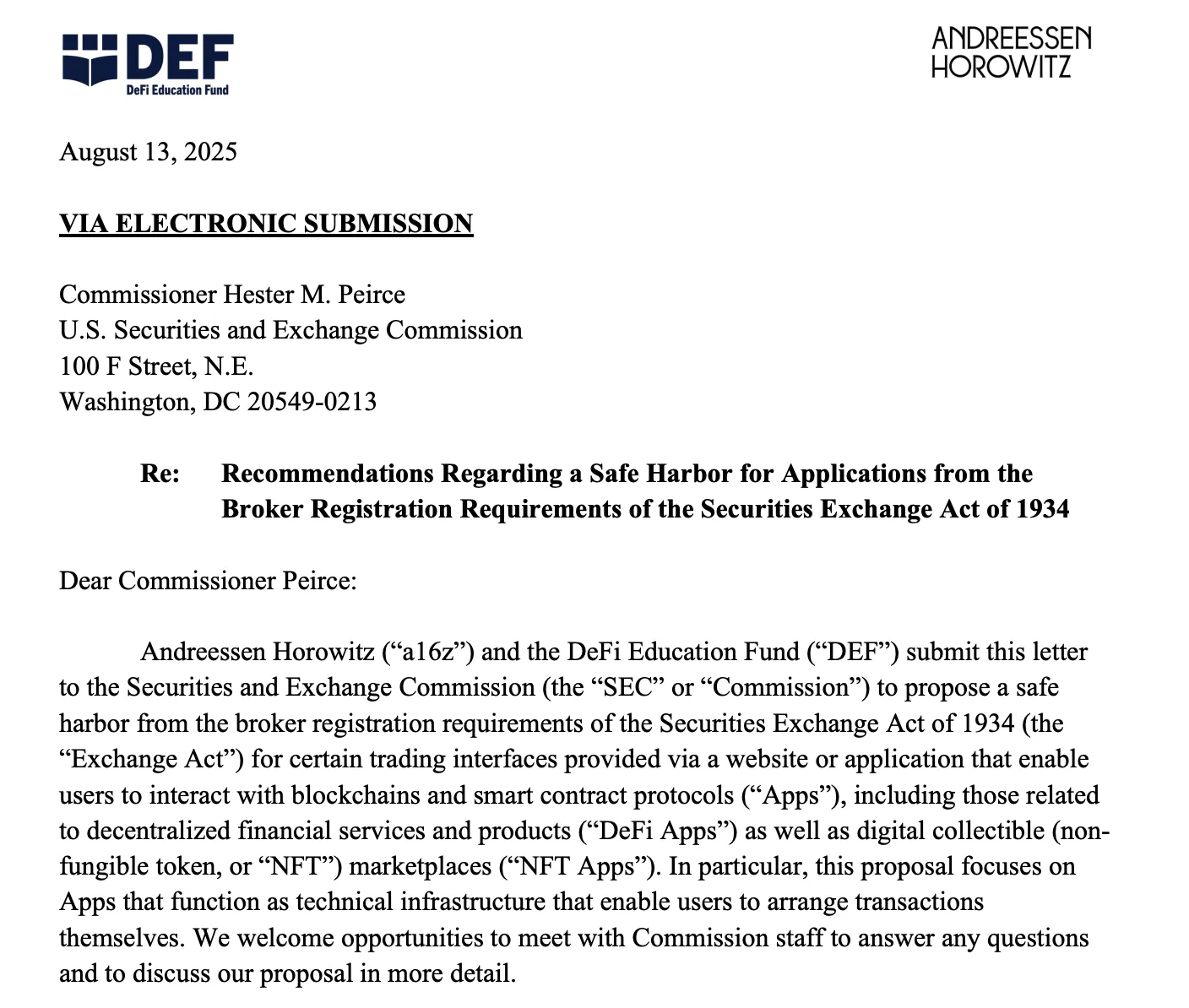🛡️ A16z & DeFi Education Fund Push for NFT and DeFi Safe Harbor at SEC
-

Andreessen Horowitz (a16z Crypto) and the DeFi Education Fund have formally requested that the U.S. Securities and Exchange Commission (SEC) establish a “safe harbor” for NFT and DeFi applications—freeing certain projects from the burdens of broker-dealer registration under the Exchange Act.
 The Proposal
The ProposalIn a letter addressed to SEC Commissioner Hester Peirce, the two organizations urged the Commission to:
Provide regulatory clarity for NFT and DeFi apps
Offer relief from broker-dealer, exchange, and clearing agency registration
Enable developers to build without fear of misclassification or enforcement
They argue that apps not posing the risks the Exchange Act was designed to manage should not require full registration.
“Only those apps that don't pose broker-dealer risks should qualify. For the rest, current legal frameworks are outdated and stifling.” – Excerpt from the letter
 ️ Regulatory Context
️ Regulatory ContextThe push aligns with prior calls from President Trump’s Working Group on Digital Assets and SEC Chair Paul Atkins, who acknowledged the need to modernize outdated rules.
The SEC has previously taken action against major crypto players like Coinbase, Kraken, and Cumberland DRW for alleged unregistered broker-dealer activity.
In 2020, the Special Purpose Broker-Dealer (SPBD) category was introduced for handling digital asset securities, but its use remains optional and limited in scope.
 ️ Why It Matters
️ Why It MattersA safe harbor could provide breathing room for crypto startups while maintaining SEC oversight for high-risk cases.
It would potentially affect thousands of projects—especially those launching NFTs, airdrops, or DeFi platforms with no clear legal classification.
This comes as Congress is considering the CLARITY Act, a comprehensive bill to define crypto market structure, which passed the House in July and awaits Senate action.
🧩 A16z’s Broader Plan
This isn’t a16z’s first push. In March, they proposed:
A safe harbor for NFTs
Additional clarity for airdrops and network tokens
They continue to position themselves as one of the most active policy influencers in crypto regulation.
 Final Thought
Final ThoughtAs U.S. crypto firms face increasing regulatory friction, safe harbor frameworks may become essential tools to prevent innovation flight while still ensuring consumer and investor protection.
-
This proposal feels like the kind of middle ground the U.S. desperately needs. Right now, NFT and DeFi developers either operate in a gray area or move offshore entirely. A safe harbor wouldn’t be a “get out of jail free” card — it would simply give builders a defined window to prove their projects are low-risk before the SEC drops the broker-dealer hammer. The danger, of course, is bad actors abusing that breathing room. The success of this idea depends entirely on clear qualification rules and a strong off-ramp if a project drifts into high-risk territory.
-
If the SEC adopts even a limited version of this safe harbor, it could be the first real sign that regulators are willing to modernize for Web3. Right now, outdated securities laws from the 1930s are being force-fit onto blockchain ecosystems — a mismatch that’s choking early-stage innovation. The fact that a16z is pairing this with lobbying for the CLARITY Act shows they’re playing the long game: win short-term breathing room and push for lasting structural reform. If Congress and the SEC both move in sync, we might finally see the U.S. stop bleeding crypto talent to other jurisdictions.

















